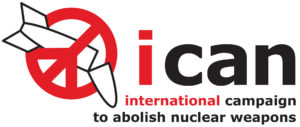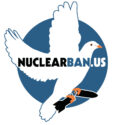 ICAN, the International Campaign to Abolish Nuclear Weapons, is a diverse coalition of groups from all over the world, working towards the common aim of eliminating all nuclear weapons from the face of the earth. It is largely made up of young people, with enormous energy and commitment to creating the kind of world they want to live in. They don’t take ‘no’ for an answer and they have made remarkable progress in a very short space of time on an issue of huge importance which has remained unresolved – and out of most people’s minds – for decades.
ICAN, the International Campaign to Abolish Nuclear Weapons, is a diverse coalition of groups from all over the world, working towards the common aim of eliminating all nuclear weapons from the face of the earth. It is largely made up of young people, with enormous energy and commitment to creating the kind of world they want to live in. They don’t take ‘no’ for an answer and they have made remarkable progress in a very short space of time on an issue of huge importance which has remained unresolved – and out of most people’s minds – for decades.
ICAN began in 2007 in Australia, as a project of the International Physicians for the Prevention of Nuclear War. It was officially launched as an international campaign in Vienna, Austria, later that year. Inspired by the successful campaign to ban landmines and initially supported by a few key governments like Norway, ICAN has grown in 10 years to become a global coalition of more than 450 non-governmental organizations in more than one hundred countries. Representatives from 10 international organizations make up the International Steering Group of ICAN, and a small staff of 3 full-time and 2 part-time staff run the international office in Geneva.
ICAN is a wholly independent and not connected to any government. But it has the support of the International Red Cross and Red Crescent Movement and a large and growing number of countries, who have either participated in, voted for, or now signed the International Treaty on the Prohibition of Nuclear Weapons, or ‘Nuclear Ban Treaty’. ICAN was awarded the 2017 Nobel Peace Prize “for its work to draw attention to the catastrophic humanitarian consequences of any use of nuclear weapons and for its ground-breaking efforts to achieve a treaty-based prohibition of such weapons.”
